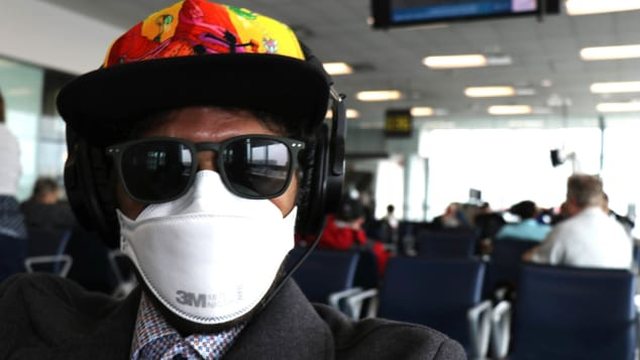
Eihab Boraie is a multimedia artist, festival organizer and freelance writer who has won many international awards and is now a member of the CairoScene Team.
Staying in Cairo with my family or catching the last plane to Canada to meet the love of my life? I had to settle quickly but I was afraid that traveling during this pandemic was the equivalent of suicide, or worse, murder.
When Covid-19 started spreading around the world, I believed that no country was safe and self-isolation was the best thing possible. Still, love will make you crazy.
I am a Canadian-Egyptian and my girlfriend is Italian-American, Francesca Brundisini, who is working in Quebec City. She is new to the city and feared that solitary confinement, without friends or family, would disrupt communication if affected by the virus.
When news of the pandemic broke out around the world, we both realized that this crisis would last more than a few weeks. It was the distance, the insecurity and an alarmed Italian mother that pushed me to do something.
I had no guarantee I would get a ticket and leaving the family alone, it was excruciating. Both of my parents are in their 60s and are very at risk because they suffer from various health problems, including diabetes and heart problems. Leaving them meant that I could never see them again.
They encouraged me to try and get a ticket because they were worried about my partner being alone in Canada, but also because we all thought that finding a ticket would be impossible.
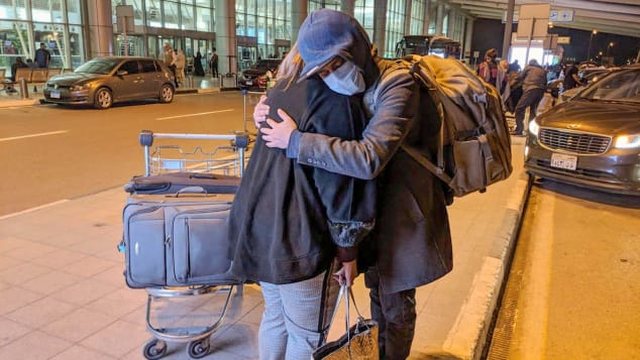
Once Egypt announced that its airports would be closed on March 19, the only remaining tickets went up from $ 700 to over $ 3,000, most of which would stop at virus-ravaged countries. I decided to try the chance and listed the name on EgyptAirâ??s waiting list for a direct flight to Toronto, hoping for a miracle. I assumed the only way back home was if the Canadian government sent a plane to stranded Canadians.
Incredibly, a few hours before the airport closed, I received a call confirming that I had a place on my last flight to Canada.
I hurried to EgyptAir's office and got the ticket. As I walked out, my eye caught a jewelry store nearby. It was funny that such a non-essential store was open, but it seemed like the universe knew I needed one at that moment.
On the way home, I saw Egyptian servicemen scattered around the city preparing to occupy the respective sites, an action that often indicates a curfew could occur.
The memories of compulsory extravagance during the Egyptian uprisings began again, but this time, these measures were, surprisingly, to limit infections.
I arrived at the airport and gave a big hug to my parents, hoping it wouldn't be the last. Overwhelmed with emotion, I entered the terminal waiting to see scenes of chaos. Instead, the building was empty.

Prior to this pandemic, Cairo Airport had been very quiet, as tourism had been facing recent political and social upheavals following the Egyptian uprisings. I had seen it empty during those times, but this time it was different. There was no queue during the security check. Along the airport, it seemed that most workers wore masks and sometimes gloves, but not all of them. I noticed that some luggage workers had not taken action.
When I arrived at the check-in counter, I was told this was the last flight to Canada. There was no other flight at that time. The lack of departures was a relief, as it allowed passengers to socially distance themselves from each other. At no point was my temperature checked and no one asked for any symptoms. Later, I learned from a relative who got on the same plane that they had checked the temperature on arrival at Cairo airport.
The queue for boarding the plane was heavily populated and uncomfortable. Most of the passengers wore masks and gloves, revealing only irritability to the eyes. Those who did not wear masks were often the elderly or young people indifferent to the crisis in question.

Two passengers refused to take their seats because they had to sit next to the toilets. After a failed attempt to switch seats, they finally decided to lose their last tickets. Every decision made on this journey seemed to be related to life or death. Landing next to a toilet on a fully booked flight can certainly increase your chances of getting infected.
The worst case scenario would have been sitting next to a passenger with symptoms, which is exactly where I found myself. Stuck between a 72-year-old mother and her 38-year-old daughter, I was offered immediate hand sanitizer. The mother wore a mask but had runny nose and cough. As the girl, sitting by the window, had no safeguards and did not seem too concerned about the danger while traveling.
There was not one passenger on board who could anticipate the series of decisions made that week and it seemed everyone had to scramble for a ticket. Departure was delayed by passengers who refused to sit near the toilet.
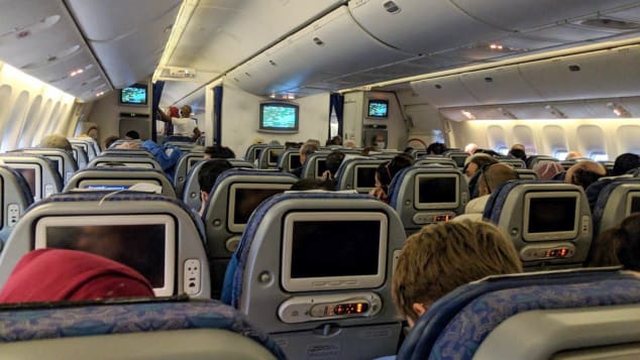
The mother mentioned that their efforts to obtain help from the consulate were not in vain. Her daughter believed that personally visiting EgyptAir's office was the reason they found places.
During the flight I was in great distress, as every cough reminded me that I was alongside the invisible enemy. I asked my mom if she was feeling well, but she kept reassuring me that she was okay.
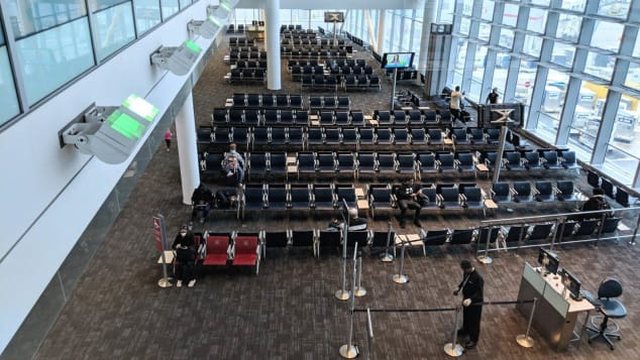
I arrived in Toronto and waited for the airport to be filled with Canadians returning from around the world, after Prime Minister Justin Trudeau had recently asked overseas citizens to go home. To my surprise, the airport was as barren as Cairo. When we got off the plane, security personnel distributed leaflets to remind people to be isolated for two weeks.
At customs, they randomly asked me if I had any symptoms, but again they did not check my temperature. None of the staff at the counter wore masks. Until the next flight, I had 7 hours left. I decided to explore the airport and discovered a medical clinic. I asked if they had a Covid-19 test, but they opened my eyes and gave me a number I could call if I had symptoms.
By noon, there were only a handful of passengers left at the airport.
"I used to work here during SARS, but even then, the airport has never been so empty," one airport security guard told me.
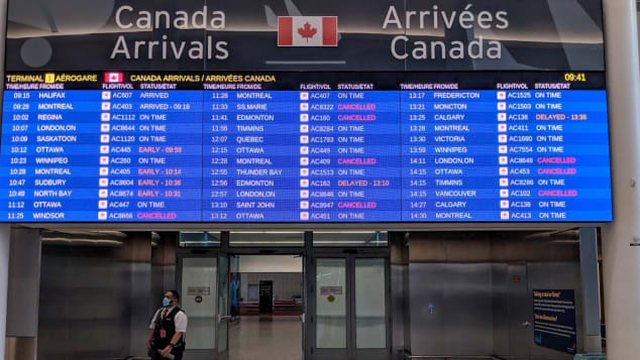
The plane to Quebec City was half empty, making most of the passengers landing alone. Upon arrival I realized that I had traveled from Cairo to the city of Quebec during a global pandemic, with no basic controls.
By the time I got there, more than a thousand people had died from Covid-19, and the number of those affected had exceeded 10,000 worldwide.
When my girlfriend Francesca arrived, I knelt down and proposed to them. She accepted my proposal, we removed our masks and made it official with a long kiss.

I was very relieved when she told me YES, because it showed that her trip was worth it. I can't imagine what I would have done if she had refused me, since I could not go back to Egypt.
The fiancée liked the ring very much, but both denounced that the kiss sealed the deal after she agreed to become infected with the virus, which I hoped I would not have. When her family and friends heard about the engagement, we were all congratulated. For many, this was the first good news they had heard in more than a month.
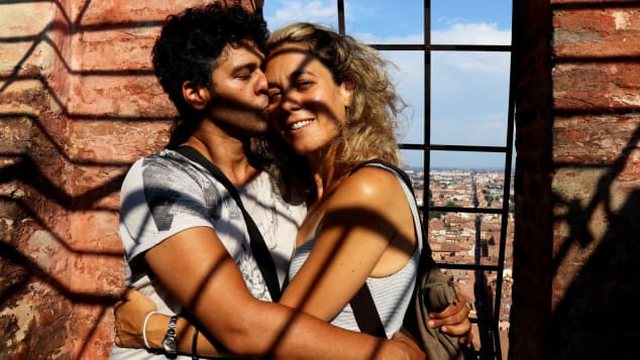
If I learned anything from this crisis is that time is unpredictably short and if I was willing to risk her health, I should also be willing to spend the rest of her life together.
Our hope is that we will enjoy each other beyond the next couple of weeks, but we both know there is no certainty if the travel risk was worth it until our quarantine is over.
When the world heals, our plan is to get married in Italy, on the island of Giglio, but it's hard to imagine when that might happen. Until that day, the sole purpose is to stay isolated and survive quarantine.





